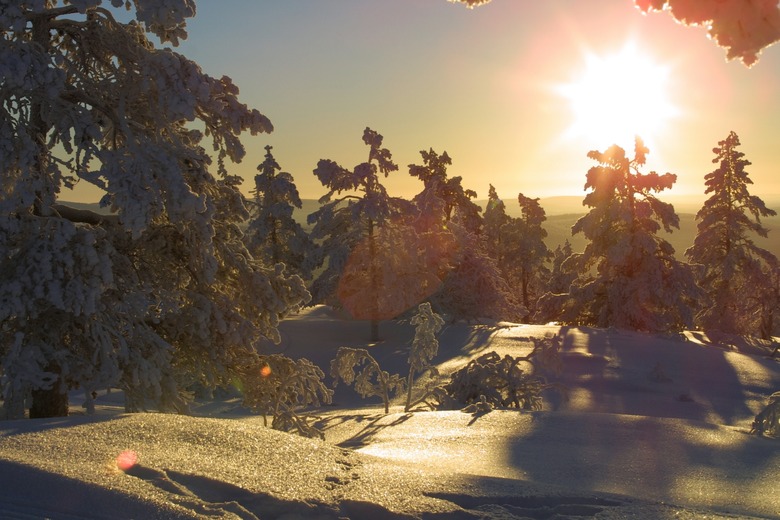How To Keep Solar Hot Water From Freezing
Using solar panels to heat your water can significantly reduce your energy costs, but if you live in a cold climate, you have to design your system to prevent freezing. Cold-weather solar heating arrays typically employ a heat exchanger sealed inside the water tank, and they circulate either glycol or water. If the system circulates water, it usually has a mechanism that drains the water out of the panel whenever there's no sun.
Cold Weather Design
Cold Weather Design
In the simplest solar heater design, potable water circulates between the panels and the storage tank, and users use that water by drawing it out of the tank. In this open-loop design, however, water in the panel is subject to freezing, so systems in cold climates usually employ a closed loop instead. In one version, glycol circulates through the panels and through a heat exchanger — often a copper coil — inside the water storage tank. Another version uses water that automatically drains out of the system into an indoor tank when there's no sun. In both cases, the circulating fluid is never in direct contact with the stored water.
A Glycol Closed-Loop System
A Glycol Closed-Loop System
The extremities of the "loop" in a glycol closed-loop system are the tubes or coils inside the solar panels and the coils inside the storage tank. A pump keeps fluid circulating between them, and it must be programmed to shut off whenever the temperature of the panels dips below that of the water in the tank. The system also requires an expansion tank to regulate pressure. Glycol makes a good circulating fluid, because it is non-toxic and doesn't freeze in cold weather, but keeping it circulating efficiently usually requires a number of sensitive valves and controls.
Drainback Systems
Drainback Systems
Some closed-loop systems use water as the circulating fluid instead of glycol. In order to keep from freezing inside the panel coils or tubes, water drains out into a reservoir whenever the sun goes down or the temperature drops below a pre-set point. This type of system is more efficient than a glycol closed-loop system, because water transfers heat better than glycol, but because it needs an extra storage tank for the circulating water, it is more expensive to install. It also needs precise controls and sensors, since draining the water at the proper time is crucial for preventing freezing.
Considerations
Considerations
A closed-loop system doesn't have to only circulate glycol or water. Other possibilities include air, hydrocarbon oils, refrigerants and silicones. None will freeze in cold weather, but all have disadvantages when compared with glycol or water. Tube-style panels, which are less sensitive to ambient temperature than panels with coils, are the better choice for a cold-weather solar heating system. The copper absorbers through which the heating fluid passes are enclosed in glass tubes from which the air has been evacuated. The construction minimizes heat loss from the absorbers, which is especially important in cold climates.
References
Cite This Article
MLA
Deziel, Chris. "How To Keep Solar Hot Water From Freezing" sciencing.com, https://www.sciencing.com/keep-solar-hot-water-freezing-2289/. 24 April 2017.
APA
Deziel, Chris. (2017, April 24). How To Keep Solar Hot Water From Freezing. sciencing.com. Retrieved from https://www.sciencing.com/keep-solar-hot-water-freezing-2289/
Chicago
Deziel, Chris. How To Keep Solar Hot Water From Freezing last modified March 24, 2022. https://www.sciencing.com/keep-solar-hot-water-freezing-2289/
